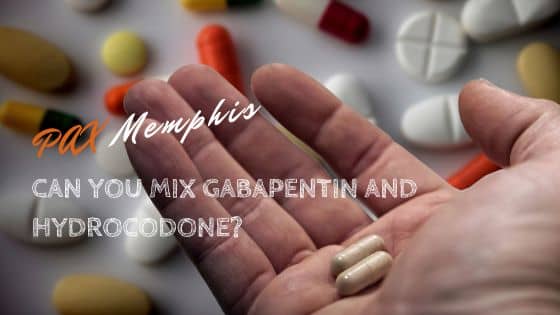Millions of Americans suffer from chronic pain every year. According to the Centers for Disease Control (CDC), “an estimated 20.4% of U.S. adults had chronic pain and 8.0% of U.S. adults had high-impact chronic pain.”[1]
Typically, chronic pain is treated with physical therapy and medication. Some of the most common medications for treating chronic pain include gabapentin, an anticonvulsant, and opioids like hydrocodone. While gabapentin is intended to treat nerve pain, hydrocodone can be used for a wide variety of different types of pain, including after you go through surgery or experience injuries.
Chronic pain can be difficult to deal with, especially because it can impact your ability to function in your daily life. Sometimes this type of pain can make it difficult to complete daily tasks like showering, walking, or even sitting upright. Because of this, sometimes it is impossible to avoid taking medications.
While you should always treat your chronic pain in the manner your doctor advises, it’s important to be aware of certain medications that should not be combined. One of these deadly drug combinations is gabapentin and hydrocodone.
What is Gabapentin?
Gabapentin is a medication that belongs to a class of drugs known as anticonvulsants. These drugs are used to treat seizure disorders.[2] However, gabapentin is commonly used to treat nerve pain. Gabapentin works by altering the activity of nerves inside of your brain to promote relaxation and pain relief.
While gabapentin is considered to have a low risk for abuse, it is possible to become addicted to it. Some individuals may begin abusing their gabapentin to experience a euphoric and relaxing effect.
On the other hand, some people might begin to mix their gabapentin with other substances of abuse to increase the effects. This can be incredibly dangerous, especially if you are combining it with an opioid drug like hydrocodone.
What is Hydrocodone?
Hydrocodone is a painkiller that belongs to a class of drugs known as opioids.[3] While these substances are highly effective in reducing the symptoms of pain, they are also known to be extremely addictive. Hydrocodone works by changing the way certain neurotransmitters interact in the brain, preventing you from experiencing pain.
According to the DEA, “The 2016 National Survey on Drug Use and Health (NSDUH) reported that 6.9 million people in the U.S., aged 12 and older, misused hydrocodone in the past year.”[3]
Because hydrocodone is a known drug of abuse, it is common for people to combine it with other mind-altering substances. Unfortunately, when combined with specific substances, hydrocodone can cause life-threatening effects such as overdose.
Can You Mix Gabapentin and Hydrocodone?
According to the National Institutes of Health Library of Medicine, “Prescription opioid use is highly associated with risk of opioid-related death, with 1 of every 550 chronic opioid users dying within approximately 2.5 years of their first opioid prescription.”[4]
Because hydrocodone is an opioid, you must use extreme caution when taking it. You should only take the medication as it is prescribed by your doctor and avoid mixing it with other substances unless advised. (Klonopin)
One of the medications you should not mix hydrocodone with is gabapentin. Unfortunately, because both substances are used to treat pain, some medical professionals might prescribe them together, but this is not advised because combining these medications can lead to an overdose that causes respiratory depression and death.
Studies have found that among patients receiving prescription opioids, concurrent treatment with gabapentin was associated with a substantial increase in the risk of opioid-related death.[4]
Risks of Combining Hydrocodone and Gabapentin
Both gabapentin and hydrocodone are central nervous system (CNS) depressants so they both slow down activity in your brain. Using two CNS depressants at the same time can result in life-threatening effects, as the processes and functions in your brain can be slowed to dangerous rates.
In addition, hydrocodone and gabapentin can both cause mind-altering effects. You can develop an addiction to both substances or a combination of the two. Addiction poses a wide range of adverse effects, including financial devastation, social isolation, and the development or worsening of physical or mental health conditions.
Possible risks of mixing hydrocodone and gabapentin include:
- Dizziness and drowsiness
- Sedation
- Impaired judgment
- Trouble concentrating
- Increased risk of vehicular accidents
- Slowed reaction time
- Motor coordination issues
- Coma
- Overdose
- Death
A gabapentin or hydrocodone overdose can quickly become fatal. If you or a loved one mix these substances and experience the symptoms of an overdose (i.e. slowed breathing, weakened pulse, or bluish tint to the fingertips and lips), you must contact emergency medical services immediately.
Get Help for Gabapentin or Hydrocodone Abuse
If you are addicted to gabapentin, hydrocodone, or a combination of the substances, professional drug rehab can help. With a combination of evidence-based behavioral therapy, group counseling, and relapse prevention planning, you can regain control over your life and achieve long-term sobriety.
To get connected with a reputable drug rehab program near you, contact PAX Memphis today.
References:
Medically Reviewed: September 25, 2019

All of the information on this page has been reviewed and verified by a certified addiction professional.










